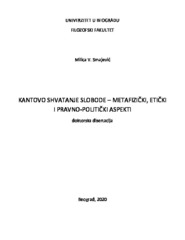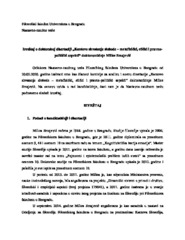Приказ основних података о дисертацији
Kantovo shvatanje slobode - metafizički, etički i pravno-politički aspekti
Kant's conception of freedom - metaphysical, ethical and legal-political aspects
| dc.contributor.advisor | Dobrijević, Aleksandar | |
| dc.contributor.other | Đurić, Drago | |
| dc.contributor.other | Bogdanovski, Mašan | |
| dc.creator | Smajević, Milica | |
| dc.date.accessioned | 2020-09-18T10:37:52Z | |
| dc.date.available | 2020-09-18T10:37:52Z | |
| dc.date.issued | 2020-06-11 | |
| dc.identifier.uri | http://eteze.bg.ac.rs/application/showtheses?thesesId=7564 | |
| dc.identifier.uri | https://fedorabg.bg.ac.rs/fedora/get/o:22468/bdef:Content/download | |
| dc.identifier.uri | http://vbs.rs/scripts/cobiss?command=DISPLAY&base=70036&RID=20542985 | |
| dc.identifier.uri | https://nardus.mpn.gov.rs/handle/123456789/17412 | |
| dc.description.abstract | Ova disertacija pruža detaljnu analizu Kantovog shvatanja slobode u kritičkom periodu. Polazeći od Kritike čistog uma i analize treće antinomije i transcendentalnog pojma slobode, dolazimo do zaključka da je nemoguće pružiti dokaz postojanja transcendentalne slobode, ali da je moguće pokazati da je ona logički zamisliva i da nije suprotstavljena prirodnim zakonima. Dokazivanje zamislivosti transcendentalne slobode i opravdanosti njenog pretpostavljanja uprkos neupitnom postojanju prirodne uzročnosti, ostavilo je Kantu dovoljno prostora da sedam godina kasnije, u svojoj Kritici praktičkog uma, iznese dokaz realnosti slobode, shvaćene u praktičnom smislu. Kant izvodi postojanje praktične slobode iz moralnog zakona kao činjenice uma. Međutim, Kant se nije zaustavio na ovome, nego je u svojoj Metafizici morala i kraćim spisima iz filozofije istorije otišao i korak dalje, pokušavajući da pokaže da nam ovaj dokaz realnosti praktične slobode nameće zadatak da uspostavimo društveni sistem koji će svakom pojedincu omogućiti njeno neometano ispoljavanje. Glavna teza koju ćemo zastupati u ovom radu jeste da su transcendentalni, praktični i pravno-politički pojam slobode međusobno konzistentni i da proizlaze jedan iz drugog. Pokazaćemo da dokazivanje logičke zamislivosti transcendentalnog pojma slobode omogućava Kantu da kasnije pripiše realno postojanje praktičnoj slobodi, a na kraju i da tvrdi da je sloboda, shvaćena u pravno-političkom smislu, osnovno pravo koje pripada svakom pojedincu kao građaninu jedne države. Kant je razvijao svoje shvatanje slobode uporedno sa razvojem svoje doktrine transcendentalnog idealizma, a videćemo da su ova dva procesa međusobno usko isprepletena. Pored argumentativnog, doprinos ove teze sastoji se i u činjenici da ona nudi jednu sistematičnu studiju o Kantovom shvatanju slobode iz kritičkog perioda | sr |
| dc.description.abstract | This dissertation provides a detailed analysis of Kant's understanding of freedom in the critical period. Starting from the Critique of Pure Reason and the analysis of the third antinomy and the transcendental notion of freedom, we come to the conclusion that it is impossible to provide proof of the existence of transcendental freedom, but that it is possible to show that this concept is logically conceivable and is not opposed to natural laws. Demonstrating the conceivability of transcendental freedom and the justification of its presumption despite the indisputable existence of natural causality, left Kant ample room to present, seven years later, in his Critique of Practical Reason, proof of the reality of freedom, understood in practical terms. Kant derives the existence of practical freedom from moral law as a fact of reason. Kant did not dwell on this, but in his Metaphysics of Morals and in short writings on the philosophy of history, he went a step further, trying to show that this proof of the reality of practical freedom imposes the task of establishing a social system that will allow each individual to have an undisturbed expression of freedom. The main thesis we will defend in this dissertation is that the transcendental, practical, and legal-political notions of freedom are mutually consistent and derive from one another. We will show that proving the logical conceivability of the transcendental notion of freedom allows Kant to later ascribe a real existence to practical freedom, and finally to claim that freedom, understood in legal and political terms, is a fundamental right that belongs to every individual as a citizen of a state. Kant developed his understanding of freedom in parallel with the development of his doctrine of transcendental idealism, and we will see that these two processes are closely intertwined. In addition to argumentative, the contribution of this thesis also lies in the fact that it offers a systematic study of Kant's conception of freedom from the critical period | en |
| dc.format | application/pdf | |
| dc.language | sr | |
| dc.publisher | Универзитет у Београду, Филозофски факултет | sr |
| dc.relation | info:eu-repo/grantAgreement/MESTD/Basic Research (BR or ON)/179041/RS// | |
| dc.rights | openAccess | en |
| dc.source | Универзитет у Београду | sr |
| dc.subject | Kant | sr |
| dc.subject | Kant | en |
| dc.subject | transcendental freedom | en |
| dc.subject | transcendental idealism | en |
| dc.subject | natural causation | en |
| dc.subject | moral law | en |
| dc.subject | autonomy | en |
| dc.subject | social order | en |
| dc.subject | federation of nations | en |
| dc.subject | cosmopolitanism | en |
| dc.subject | transcendentalna sloboda | sr |
| dc.subject | transcendentalni idealizam | sr |
| dc.subject | prirodna uzročnost | sr |
| dc.subject | moralni zakon | sr |
| dc.subject | autonomija | sr |
| dc.subject | društveno uređenje | sr |
| dc.subject | federacija naroda | sr |
| dc.subject | kosmopolitizam | sr |
| dc.title | Kantovo shvatanje slobode - metafizički, etički i pravno-politički aspekti | sr |
| dc.title.alternative | Kant's conception of freedom - metaphysical, ethical and legal-political aspects | en |
| dc.type | doctoralThesis | en |
| dc.rights.license | ARR | |
| dc.identifier.fulltext | https://nardus.mpn.gov.rs/bitstream/id/65260/IzvestajKomisije23197.pdf | |
| dc.identifier.fulltext | https://nardus.mpn.gov.rs/bitstream/id/65259/Disertacija.pdf | |
| dc.identifier.rcub | https://hdl.handle.net/21.15107/rcub_nardus_17412 |



